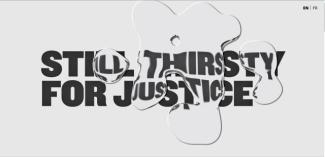DROP BY DROP
PSAC doubles down on efforts to make right to clean water a reality

MOST OF US TAKE CLEAN water for granted. In Vancouver, Toronto or Montreal, it’s hard to imagine that anybody would go without clean water running out of their tap, for a week, let alone a decade. Sadly, this isn’t the case for Indigenous communities all across the country.
For the past several decades, there have been over 100 long-term drinking water advisories active at any given moment in Canada, disproportionately situated within Canada’s Indigenous communities.
A slow trickle of progress
While progress has slowly been made, it simply has not been enough. At the time of writing, there are still dozens of water-boiling advisories in place in these settlements, with residents struggling with dilapidated infrastructure, corporate pollution, contaminants and disease, and even toxic levels of mercury in their water.
It’s important to remember that a single drinking water advisory could mean as many as 5,000 people lacking access to safe, clean drinking water—and right now, 73 per cent of First Nations’ water systems are at high or medium risk of contamination. That means tens of thousands of people who can’t even use water out of their own tap, without fear of getting sick or even dying.
What are people supposed to do when their own government won’t even provide them safe, clean water, one of the most basic necessities of life? It’s not like we have a lack of water. (Canada has 20% of the fresh water on our entire planet.) Indigenous people are simply being left behind.
PSAC ‘Still Thirsty for Justice’
Situations like this can leave you feeling hopeless. If protesting, organizing, and loudly demanding your government help you isn’t enough to win you a basic right, what do you do? The PSAC (the Public Service Alliance of Canada) answer is: do more.
In collaboration with Indigenous communities and in the spirit of reconciliation, PSAC has launched Still Thirsty for Justice, a second campaign to demand safe, clean, water for all.
“It’s been decades of empty government promises to end the water crisis in this country,” says Chris Aylward, National President of PSAC. “This country’s commitment to reconciliation hinges on immediate action by the federal government.”
PSAC launched it’s first Thirsty for Justice campaign in 2016, in partnership with Grassy Narrows, a community whose water supply has been contaminated with mercury and other pollutants for more than fifty years. Since then, all of the population has been harmed by mercury poisoning. Grassy Narrows community leader Steve Fobister and his father, former chief Simon Fobister Sr., both died of mercury poisoning.
Increasing the flow
Still Thirsty for Justice, begins where the first PSAC campaign left off, visiting the communities of Grassy Narrows and Samson Cree, and broadening the picture of how the water crisis is impacting many others across Canada and the First Nations —including PSAC members.
PSAC members across the country are banding together for a media blitz, sharing their stories in the struggle for clean water. The campaign hopes that these stories will finally communicate just how deeply these issues affect them and their communities, as well as how the government is so blatantly failing in its promises to end these advisories once and for all.
The campaign is called Still Thirsty For Justice because in a country as rich and technologically advanced as ours, it’s a crime that anybody should have to put themselves at risk just to drink a glass of water. Whether you are living in a rural community or in downtown Toronto, the fact remains: every person in this country deserves access to their most fundamental rights, and the best way to achieve that is for working class people to band together, no matter the distance between them.
Why unions always matter
It’s an important development in the fight for fair treatment for Canada’s Indigenous people and shows the positive social impact that labour unions can have, outside of just their members’ workplaces. If individual citizens demand change from politicians, and those demands are not met or are even flat out ignored, labour unions have the unique opportunity to step in as a progressive third party, wield their influence and power, and push the government to do better.
If corporations can lobby the government and pollute our lakes and rivers, then it’s time that working people have their own way of pushing back—for us, it’s the strength of a union, backed by thousands of united working class people with a common interest: social, economic and environmental justice.
At the end of the day, unions aren’t just for settling disputes with your boss. They’re a vehicle for the interests of the working class. The rich organize themselves through corporations. What do the working class have? We have our unions. In partnering with Indigenous communities on such a critically overlooked issue, PSAC is setting an important precedent in the fight for social justice.
- 30 -













Add new comment